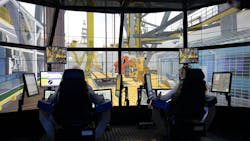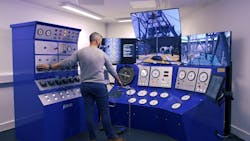Bespoke drilling simulators assure operational safety
By Max Wyndham, 3t Drilling Systems
The paralyzing uncertainty of the COVID-19 pandemic caused an immediate drop in drilling activity, with the effects felt throughout the industry. Now, over four years on, continued consolidation since before the pandemic and commodity prices have contributed to today’s ever-improving picture, with rig contract durations and day rates on an upward trend. Projections see global active rig count increasing through 2025 and 2026, with some reports that the current upcycle will last beyond 2030.
A recent snapshot could view this as growth, but a longer view of history could arguably show this as a recovery from the conditions at the end of 2015.
A complete view of events in the last decade and their impact on our industry’s workforce is important, as it demonstrates why the recovered activity has not been delivered by the level of skilled and experienced personnel you would expect.
The downcycles during this period caused compounding difficulties for companies in retaining skilled and experienced personnel. As the industry emerges into a new era, the faces among the crews are different. Many experienced personnel have left the industry or retired altogether.
Utilizing simulator technology for workforce development
Contractors and service providers have been under pressure to expand operations while maintaining high levels of operational efficiency—and without any compromise to safety. The practical reality is that compromises must be made. Personnel need to be hired or promoted, and acceptable training and experience levels are less than when experience was easier to come by.
Solutions for accelerated training, workforce development and competence assessment are vital in giving the industry flexibility to hire and develop people at the required rate while allowing them to maintain or improve their standards.
Demand for accelerated development has led to an increased need for bespoke simulation. There is increased emphasis on training infrastructure that aligns with a contractor’s specific equipment and operating procedures. While simulators for well control have always been a staple in drilling contractors’ in-house training programs, drilling and pipehandling operations based on rig-specific equipment and emulated human-machine interface (HMI) systems are now the new global standard. The simulator’s Cyberchair is required to offer the same hardware and touchscreen controls as the rig, down to the finest detail.
Students arriving from the rig don’t want to spend valuable time learning how to use a simulator. Rig-specific controls allow more room to focus on scenarios they don’t get exposed to during daily operations. This is typically an emergency or non-routine scenario. For example, getting a BOP landing operation wrong can be costly. However, bespoke simulation facilitates training for the operation by procedure, helping to avoid lost time when performed for real.
For promotion candidates new to a driller’s chair or assistant driller’s chair, bespoke simulators enable the chance to get comfortable with the controls without worrying about the impact of human error. One ongoing project requires selection between different OEM-specific top drives, which are replicated accurately in the simulator’s graphics and HMI system per the manuals.
Movement of personnel between rigs due to growth in activity also triggers demand for rig-specific training as there are so many different systems in operation, and all rigs are slightly different. Besides main drilling equipment, pipehandling and auxiliary operations vary significantly, and dropped pipe incidents can still happen.
Customization of advanced drilling, well control and pipehandling simulation will play a vital role as the industry continues its recovery. Current developments in advanced training simulators are well-positioned to support this trend, and widespread adoption of the technology in all continents demonstrates companies’ commitment to workplace safety.
About the Author

Max Wyndham
Max Wyndham is the head of business development for simulator technology provider 3t Drilling Systems. With a commercial and technical background, he supports 3t's global client base to identify the right solutions to raise competency and safety standards across the workforce. Through 3t Drilling Systems' simulator range, Wyndham helps to deploy technology-led solutions for training, competence and localization in the oil field.

